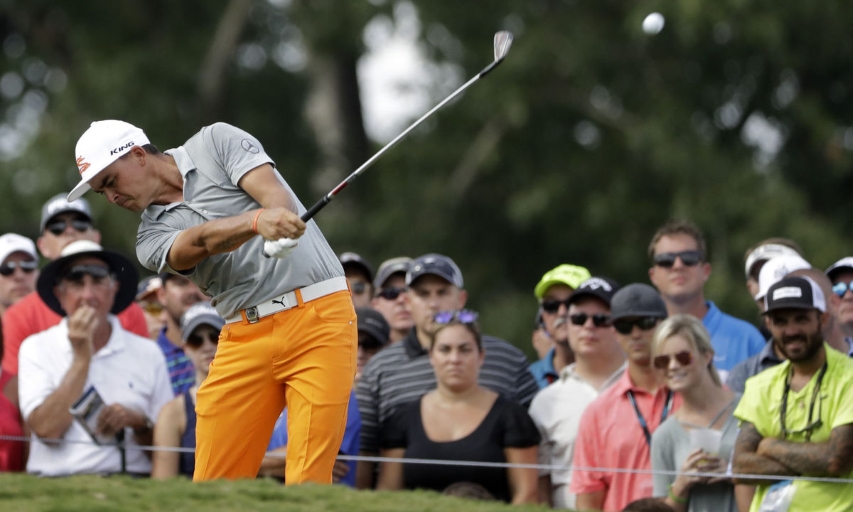Fowler Keeps Celebrating Everyone Else’s Majors
- Details
- Category: Inside Golf
- Published: 2017-08-16

Rickie Fowler Hits His Tee Shot On The 17th Hole During The Final Round Of The 2017 PGA Championship. (AP Photo/Chris O’Meara)
CHARLOTTE, North Carolina (Doug Ferguson/AP) — Rickie Fowler, golf’s version of an action hero, keeps showing up too late to save himself at the majors.
His final six holes at the PGA Championship were nothing short of remarkable, the very reason why Fowler should remain in the category of “when” and not “if” as it relates to winning a major.
Seemingly out of contention, Fowler holed a 20-foot birdie putt on No. 12 (one of only four birdies in the final round) and hit his tee shot on the 13th to 8 feet for another birdie. He drove the 14th green to 40 feet for a two-putt birdie, then nearly holed a chip on the par-5 15th for a fourth straight birdie.
That whipped social media, along with practically all of Quail Hollow, into a frenzy because everyone loves Fowler and he loves them back.
But he ran out of holes.
Fowler figured he would need two more birdies, and that nasty three-hole stretch known as the “Green Mile” didn’t give any player more than one in the final round. He still managed to keep slim hopes alive by making a pair of 8-foot par putts that he couldn’t afford to miss. Heroic stuff.
Still, the closest he came to the Wanamaker Trophy was when he posed for a picture with its new owner, Justin Thomas, a good friend who lives down the street from him in Florida. Fowler also waited behind a year ago to see Jimmy Walker polish off victory at Baltusrol to win the same trophy. And he was at the 18th green a month ago at Royal Birkdale to see Jordan Spieth clutch the claret jug.
Asked to assess this year in the majors, Fowler wrapped it up with three sentences: “Nice coming off of last year. Made all the cuts. That’s a good step.”
It was a baby step compared with his colleagues’, many of them younger, all of them in full stride.
Compared with his own standard, it was a step to the side at best, but certainly not forward. Three years ago, Fowler joined Jack Nicklaus and Tiger Woods as the only players to finish in the top 5 at all four majors (Spieth has since joined them). The difference is the other three all won a major in those years.
Fowler is still 28. He has played only 30 majors as a pro. The talent is there, and so is the ability to deliver big moments. He showed that when he won The Players Championship in 2015 and the Scottish Open later that summer.
Phil Mickelson, now with five majors and three legs of the career Grand Slam, had a comparable major championship record to Fowler at that age.
In his first 30 majors as a pro, Mickelson had three veritable chances to win. He was one shot out of the lead at Shinnecock Hills in the 1995 U.S. Open, had the 36-hole lead at Valhalla in the 1996 PGA Championship and lost to a 15-foot putt by Payne Stewart at Pinehurst No. 2 in the 1999 U.S. Open.
The knock on Mickelson shouldn’t have been that he had not won a major by then, but that with all his talent he didn’t give himself enough chances. After eight full years on the PGA Tour, Mickelson already had 16 victories.
Fowler is wrapping up his eighth full year and has four PGA Tour titles.
He also has seven top 5s in the majors, though he has shown a bad habit of starting slowly, whether it was the Masters and British Open in 2014 or the Masters and the U.S. Open this year. His best chance was in the 2014 PGA Championship at Valhalla, where he made only one mistake on the back nine and had a long eagle putt on the final hole that would have forced a playoff.
Fowler should be too young to be considered the best without a major except that four players younger than him already have at least one — Spieth, Thomas, Rory McIlroy and Brooks Koepka. At worst, he has become a sentimental choice because of the growing number of chances and the gracious manner he treats people.
Maybe the time spent celebrating everyone else’s majors will pay off.
“You can learn so much from watching your friends play well and get the job done,” Fowler said. “It’s fun to see. It also motivates you to want to go out and push yourself to another level.”
The old guard might question Fowler’s fire by his willingness to smile and celebrate majors he wants for himself.
That’s simply the way he was brought up.
“We always kept everything positive,” his father once said. “Even if he hit a bad shot, we only talk about the good shots that he hit. We never brought up any negative talk. He knew if he hit a bad shot. We didn’t need to say anything.”
The skill is there. Only Fowler knows how much he feels the sting of watching others claim majors. His greatest asset going forward might be a positive attitude, something Sergio Garcia was missing for so many years before he finally won the Masters.
The best example was at Erin Hills, when Fowler started the final round of the U.S. Open two shots out of the lead and faded from view. He was asked that afternoon about the disappointment of not winning his first major.
“If you look at the negatives too much,” he said, “you’re going to be stuck doing that the whole time.”



